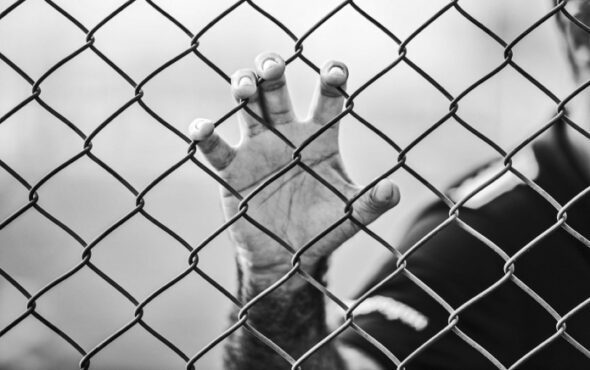
LGBTQ+ people are facing harassment, bullying and deteriorating mental health while being held in the UK’s immigration detention system, according to a groundbreaking new pilot study.
Content warning: This story may include topics that could make some readers feel uncomfortable.
Conducted by Dr Laura Harvey of the University of Brighton and supported by Rainbow Migration, a charity which provides practical and emotional support for LGBTQ+ people seeking asylum, the study looked at the experiences of five LGBTQ+ people in detention.
Four had been held in Immigration Removal Centres for several months and one in a Short-Term Holding Facility for 48 hours.
Participants reported being subjected to verbal and physical homophobic abuse from other people held in detention, some of which came from people they were forced to share locked rooms with at night.
One said that someone “spat on my face for being a gay.”
Many were scared of sharing their true gender identity and/or sexual orientation (three of the participants were gay men and two were non-binary) while in detention.
“I was so scared”
One of them, Johnson, had fled to the UK from a country in South Asia after their partner was killed in a homophobic attack and they faced repeated abuse from their family.
As a result of this trauma, they felt afraid to tell staff and those around them in detention about their non-binary identity.
“When they’ve taken me [into immigration detention] I was in big shock, I don’t know what to talk, what to tell, and I don’t know what’s going to happen … I’m in shock so that’s why I didn’t tell about my sexuality first because I was very worried what I say, I don’t want to hide my sexuality here but I didn’t tell anyone because I was so scared and I didn’t went to doctors also because I have very scared about doctors also on that time,” Johnson explained.
Some participants experienced homophobia from staff
Although some participants found staff to be a source of help and support, two shared incidents of verbal homophobic abuse and misgendering from them.
Michael, who fled from East Africa, said: “This person…told me that if not for the system in the UK that if I was still in my home town that he believed that I would, you know, walking in the street, like an outcast, like you know that by now my penis would be chopped off because of this forms of stuff I’m practising, that I’m just lucky that I found myself in here.
“That was so so disheartening, you know, I felt emotionally down and I became more depressed at night, you know, that thought was running all over me and I realised that what this person said was actually true, you know, and it gives me this feeling of, you know, not – you know I felt so ashamed and things like that, and so so down.”
Watch ⬇️ New research by @uniofbrighton released today shows that immigration detention centres continue to be very dangerous places for #LGBTQI people. They should not be detained. (1/6) pic.twitter.com/3fe7k4f7VK
— Rainbow Migration (@rainbowmigrants) February 9, 2023
The report concluded that LGBTQ+ people in detention faced worsening mental health, something that was worsened by delayed access to support and being put in situations that mirrored their past trauma.
“The life I had during detention was a miserable one,” Michael told researchers, also explaining that being detained for months made him feel hopeless about the future.
READ MORE: Home Office admits LGBTQ+ refugees sent to Rwanda may face “discrimination and intolerance”
Being held in detention, as well as trying to hide their true selves, made it hard for the study’s participants to get support from LGBTQ+ community groups and networks.
“Most participants reported that it was difficult to find LGBTQI-specific support and advice, even in cases where they were able to access more general welfare support in the detention centre,” part of the study’s findings stated.
‘No Pride in Detention’
The research aimed to explore how experiences of LGBTQ+ people in detention have changed since the introduction of the Adults at Risk in Immigration Detention policy and the last in-depth study on this issue in 2016.
Leila Zadeh, Executive Director at Rainbow Migration, said the findings show that risks facing LGBTQ+ people in detention “remain as urgent as ever.”
“LGBTQI+ people being detained for more than 6 months while suffering verbal and physical abuse is unacceptable and should be unthinkable in a country that prides itself on promoting human rights and LGBTQI+ equality,” she continued.
READ MORE: It’s time to end the detention of LGBTQ+ asylum seekers in the UK
Last year, the charity launched its ‘No Pride in Detention’ campaign which is calling for an end to the detention of LGBTQ+ people and a time limit of 28 days to ensure no one is held longer than this.
More than 4,000 people have so far signed a handraiser expressing their support for this, which you can find more information about here.



